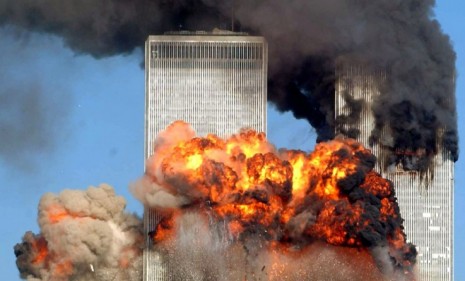The 'chilling' 9/11 audio tapes: 5 takeaways
The 114 recordings from just before, during, and after the attacks offer insights into the day's confusion and horror

A free daily email with the biggest news stories of the day – and the best features from TheWeek.com
You are now subscribed
Your newsletter sign-up was successful
Before the tenth anniversary of the Sept. 11 terrorist attacks, Rutgers Law Review compiled 114 audio recordings that vividly recount the chaos and terror of the morning of 9/11. The "chilling transcripts and tapes" document how air traffic controllers, military aviation officers, pilots, and flight crew members struggled to understand, then manage, the fatal hijackings. (Explore the interactive archives at The New York Times.) The recordings are "incredibly heavy," but also surprisingly difficult to stop listening to, said John Del Signore at Gothamist. They are "sickeningly immediate, as if that horrific morning were unfolding again right in front of you, and maybe if you could just scream loud enough, maybe you could do something." But you can't, and neither could the people on the tape. Here, five takeaways from the audio cache:
1. Betty Ong revealed the helpless terror of a hijacked flight crew
A flight attendant on American Airlines Flight 11, the first plane to hit the World Trade Center, Ong called the AA reservations number from the plane: "Um, the cockpit's not answering. Somebody's stabbed in business class, and, um, I think there is Mace that we can't breathe. I don't know, I think we're getting hijacked." The unhelpful response: "What seat are you in?"
The Week
Escape your echo chamber. Get the facts behind the news, plus analysis from multiple perspectives.

Sign up for The Week's Free Newsletters
From our morning news briefing to a weekly Good News Newsletter, get the best of The Week delivered directly to your inbox.
From our morning news briefing to a weekly Good News Newsletter, get the best of The Week delivered directly to your inbox.
2. Two of the hijackers were caught on tape
The "endlessly perusable" archives include audio snippets from two of the 19 hijackers, including ringleader Mohamed Atta. While Ong was in the back of Flight 11 talking to American Airlines officials, Atta was in the cockpit talking to a Boston air traffic controller: "Nobody move, everything will be O.K. If you try to make any moves, you will injure yourself and the airplane. Just stay quiet." The transmission from hijacker Ziad Jarrah on United Flight 93, which crashed in Pennsylvania, is shorter: "Please sit down and keep remaining sitting, we have a bomb on board, so —"
3. Officials couldn't keep up with events
Particularly striking is "the confusion of ground controllers and first responders as events unfolded before there was even time to react, let alone comprehend the scale of the tragedy that was occurring," said Noah Rothman at Politicology. In fact, this archive shows how much the "recordings contradicted the accounts of the senior officials," who long insisted that they were on top of the situation, said Jim Dwyer in The New York Times. In one frantic exchange at 9:01 a.m., after the first plane had hit the Twin Towers, an FAA manager in New York tells FAA headquarters in Virginia, "We have several situations going, going on here, it is escalating big, big time, and we need to get the military involved with us." The man in Virginia responds, "Why? What's going on?" The tapes also reveal that the FAA waited a half hour to tell the military that Flight 77 had gone offline — leaving just three minutes before it crashed into the Pentagon.
A free daily email with the biggest news stories of the day – and the best features from TheWeek.com
4. Not even the 9/11 Commission had all this audio
The project to collect all the flight recordings from 9/11 began with the 9/11 Commission, but wasn't completed and given legal clearance until after the commission was disbanded in August 2004. This year, former 9/11 Commission investigator Miles Kara hunted down the original files in the National Archive, and with help from Rutgers law students, finished reviewing and transcribing the recordings. "The story of the day, of 9/11 itself, is best told in the voices of 9/11," Kara tells The New York Times.
5. Two tapes are still locked up
The two hours of recordings have "two notable, and fascinating, omissions," says John Cook at Gawker. One is 30 minutes of audio from the flight deck of United 93, which some families of deceased passengers don't want released, Kara says. The other is a classified conference call between Vice President Dick Cheney, Defense Secretary Donald Rumsfeld, and others. John J. Farmer Jr., the dean of Rutgers Law School and senior counsel to the 9/11 Commission, says he believes those tapes are being cloistered because they detail plans to continue government operations in case the attack killed high-ranking leaders.
-
 The ‘ravenous’ demand for Cornish minerals
The ‘ravenous’ demand for Cornish mineralsUnder the Radar Growing need for critical minerals to power tech has intensified ‘appetite’ for lithium, which could be a ‘huge boon’ for local economy
-
 Why are election experts taking Trump’s midterm threats seriously?
Why are election experts taking Trump’s midterm threats seriously?IN THE SPOTLIGHT As the president muses about polling place deployments and a centralized electoral system aimed at one-party control, lawmakers are taking this administration at its word
-
 ‘Restaurateurs have become millionaires’
‘Restaurateurs have become millionaires’Instant Opinion Opinion, comment and editorials of the day